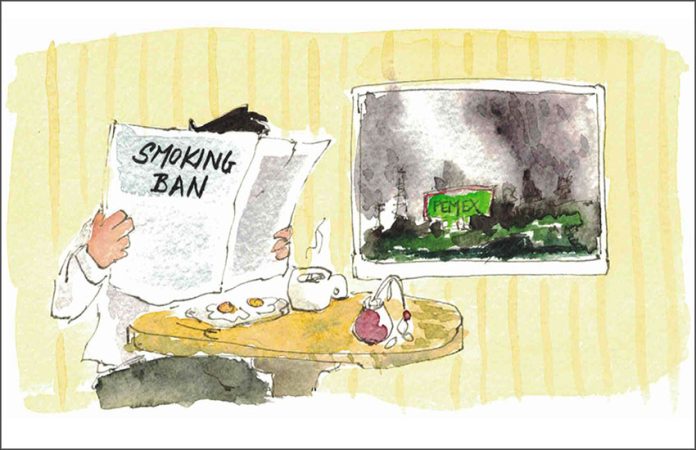Well, it’s finally happened. Smokers have nowhere else to go.
Okay, this isn’t technically true. Under Mexico’s new federal outdoor smoking ban that went into effect this week, they can still smoke at home, and they can very likely still smoke in places where both poorly-paid waiters and struggling business owners will be loath to negatively engage and/or chase off the few customers they have left (I’ve seen it).
But technically, officially, smoking is out. While I’m nowhere near heartbroken about it — cigarette smoke triggers an immediate headache in me, and I can’t stand the way the smell absorbs into my hair and clothes — I feel for those stragglers still addicted to nicotine.
And while I’ve not taken a single puff in my own life, I do know a thing or two about addiction. Who among us doesn’t? More on that below.
Growing up, nobody in my immediate family smoked (or drank, for that matter). Cigarette smoke was a smell I associated with the carnival, and to this day the distant smell of it takes me back to wandering among the rides and food stands with my parents.
When I was a teenager, my mom met and later married my second dad, Richard, a lovely man who happened to be a heavy smoker (and, in a great twist of irony, a respiratory therapist). He’s since quit, but I have clear memories of him leaving each meal as soon as the last bite was scooped up from the plate so he could step outside for a smoke.
By the time I graduated high school in 1999, smoking was already becoming less common among young people, and only those who were clearly “troubled” seemed to have any proclivity for lighting up.
When I came to Mexico a few years later, I was surprised to see that quite a lot of people still smoked — even seemingly well-adjusted people my age! Cigarettes were ubiquitous in bars and clubs, and many people, especially in Xalapa, would tell me that something about the cold, rainy weather made them crave a dry, glowing cigarette, even with the disgustingly graphic health effects displayed on the cartons.
Since then, times have changed quite a lot. After banning smoking in most places several years earlier, including bars and restaurants, Mexico has now banned cigarettes basically everywhere. You (officially) can’t smoke in public places like parks or the beach and are now essentially restricted to private residences.
Not only that, but cigarettes can no longer be advertised or displayed in stores (though they can still be sold), meaning that Mexico now has one of the strictest anti-smoking laws in the world.
While I feel for those currently still addicted to nicotine, I think it was a brave decision. It’s not very often that the country takes steps in favor of general health that could adversely affect the tourism industry. Though those who already smoke might be in for some suffering, fewer people than ever will start in the first place, and eventually cigarettes will be about as prevalent as horse-drawn carriages.
But what about our other addictions? Mexico seems to be at least trying to make a dent in our consumption of harmful foods and drinks, now listing warnings on labels about excess fat, sugar and calories and about adverse health effects. It is so far unclear if those efforts have curbed anyone’s behavior as Mexico is still rather high up on the list of global obesity rates.
Will laws against the sale of these food products eventually be passed as well? Sugar is certainly addictive, after all, and plenty of people would argue that our collective rate of obesity is a public health emergency. Of course, eating a cupcake doesn’t cause contaminated air to waft over to the people in your vicinity.
We’re all, with few exceptions, addicted to our phones and the apps on them as well, which is its own kind of emergency. If you can imagine not having the option of unlocking it for a peek at what’s going on in the online world every time you’re bored or want a distraction from something dull, painful, and/or seemingly unbearable, then you might realize how painful withdrawal is.
My point is, let’s take a moment of silence and empathy for those still addicted to nicotine before briefly pivoting over to some of our collective addictions.
Because while cigarettes will soon be a thing of the past, the government having determined (rightly) that no one deserves to be forced to breathe that stuff in, we’ve recently discovered that Mexico is still basically one big cigarette on an environmental level: with news of the amount of hydrocarbon released into the environment by the state oil company Pemex, small-scale effects on air quality continue to be replaced by large-scale effects.
This is another kind of addiction (apparently the company says that the technology to capture natural gas byproducts of the oil refining process is too expensive).
I don’t understand the power that the national energy companies have in Mexico, but, at least under AMLO, it won’t be going away. They can do what they want and, on a national level, their well-being is considered all-important — apparently at the expense of public health.
Well, one addiction at a time, I suppose. We’ve mostly collectively kicked the cigarette habit, and that’s a good thing. But when it comes to kicking the oil habit, Mexico is the very image of the archetypal smoking and pregnant mother of the 1960s. I hope that public health crisis is next on the list of things to deal with.
Sarah DeVries is a writer and translator based in Xalapa, Veracruz. She can be reached through her website, sdevrieswritingandtranslating.com
